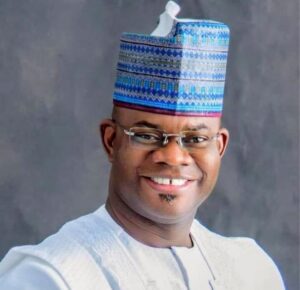

By Taiye Agbaje.

Former Governor Yahaya Adoza
Bello.
Proceedings in the ongoing money laundering trial of former Kogi State Governor, Yahaya Bello, took a dramatic turn at the Federal High Court in Abuja on Thursday, as Kemi Pinheiro, SAN, counsel to the Economic and Financial Crimes Commission (EFCC), described the matter as a “political case” due to the status of the defendant.
Pinheiro made the remark while arguments were being taken before Justice Emeka Nwite on whether defence counsel, Joseph Daudu, SAN, could begin cross-examining the fourth prosecution witness (PW-4) immediately after the evidence-in-chief, or if the process should continue the following day.
Explaining the need for expedited proceedings, Pinheiro said the case was of high public interest, involving a former state governor and a political figure who had once declared interest in running for president.
Daudu, however, countered that the matter was a criminal trial concerning allegations of money laundering, and not a political case.
Pinheiro maintained his position, stating: “I am not prosecuting a bank official; I am prosecuting a political figure.”
Justice Nwite, responding in a lighthearted tone, remarked: “If that is the case, then those handling political cases should prepare to take over the matter.”
Earlier, the judge ruled on an application brought by the EFCC seeking to “cross-examine” its own third witness, Nicholas Ojehomon, an internal auditor at the American International School, Abuja (AISA).
The court declined the request, citing legal limitations.
Justice Nwite held that a prosecution can only cross-examine its own witness after declaring them hostile, which had not occurred in this instance.
“The argument of the learned counsel to the prosecution is misconceived,” the judge said, allowing only a limited re-examination of the witness, restricted to specific portions (Pages 1, 14, and 15) of a previously admitted exhibit (Exhibit 19).
Ojehomon, in earlier testimony on May 9, had told the court that no funds were wired directly from Kogi State Government or local government accounts to AISA.
During cross-examination, he referenced a previous FCT High Court judgment which made no order for a refund of school fees or declaration of such funds as proceeds of money laundering.
Following the ruling, Pinheiro called the fourth prosecution witness, Mshelia Arhyel Bata, a compliance officer with Zenith Bank, who appeared under subpoena.
Bata confirmed that the bank had attached certificates of identification to the seven sets of account statements presented.
The court admitted statements of the Kogi State Government House Administration and six other accounts into evidence.
The witness provided explanations on transaction limits in effect at the time, stating that before the implementation of the cashless policy, the maximum allowed cash withdrawal for government accounts was N10 million per transaction.
He also confirmed a cash withdrawal of N10 million on May 23, 2016, under the name Abdulsalami Hudu, and noted nine such cash withdrawals on that same day.
Bata further identified ten separate credit entries totalling approximately N1.092 billion on January 30, 2018.
When asked about total withdrawals, he stated they amounted to N1.968 billion across different dates.
He also reviewed inflows and outflows between May 2 and May 19, 2018.
At one point, as Pinheiro questioned the witness about the withdrawals, Daudu interjected, suggesting the amounts related to security vote expenditures.
Justice Nwite adjourned the matter until June 27 for the cross-examination of the witness. (NAN).
Edited by Dada Ahmed.


